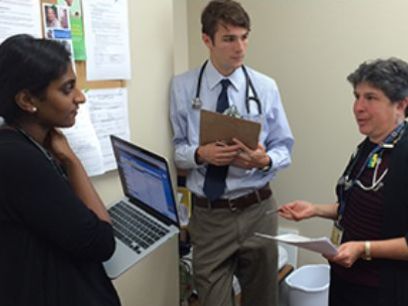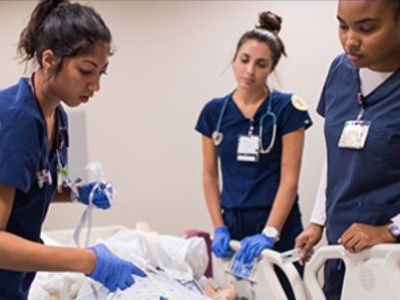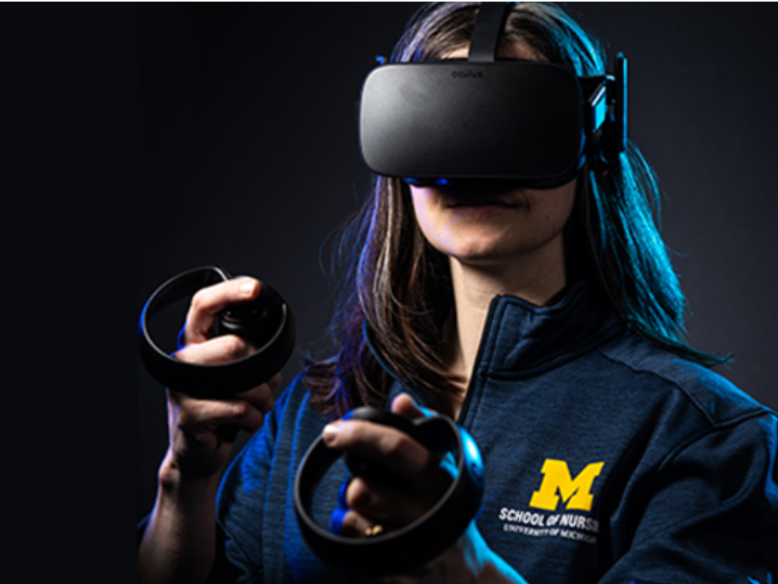Learn about the four student groups vying for your support in the We Dare Challenge
Four weeks. Four groups. One choice.
Now more than ever, the world needs nursing to continue its critical role providing high-quality care to patients while leading the transformation of our health care system in the United States. The U-M School of Nursing We Dare Challenge gives those who want to support the next generation of nurses the opportunity to choose which student-led initiatives are most important to them.
Donors will receive an exclusive invitation to a live-stream event where four student groups will present their projects in detail. Your gift gives you a vote on which project will earn the funds raised during the challenge. Learn more about the four dynamic, student-led initiatives you can support during the We Dare Challenge.

Student-Run Free Clinic
The University of Michigan Student-Run Free Clinic (UMSRFC) provides free, high-quality health care to underinsured individuals in Southeast Michigan while giving interdisciplinary health professional students the opportunity to confront health disparities through direct action. UMSRFC experiences allow the next generation of nurses to see how the provision of quality, compassionate care can help address health disparities and make a difference in someone’s life. The UMSRFC prepares Michigan nurses and nurse practitioners to be the leaders and best as advocates for the delivery of equitable health care.
At the UMSRFC, undergraduate nursing students serve as intake and discharge volunteers, while graduate students serve as clinical volunteers. Leadership opportunities for nursing students involve directorship, prescription coordination, quality improvement assessment and management, and volunteer recruitment and retention. Currently, seven nursing students hold leadership positions, and 30 more serve as regular volunteers. Nursing student leadership is now working to implement a trauma-informed care training module for all volunteers in addition to other projects, including a comprehensive diabetes management protocol; free influenza, pertussis and pneumonia vaccinations for the underinsured; and an interdisciplinary COVID-19 wellness plan.
The clinic is run in partnership between the U-M schools of Nursing, Medicine, Pharmacy, Social Work, Dentistry and Public Health.

Science Learning Circles
The Science Learning Circles program exemplifies the U-M School of Nursing’s longstanding commitment to learning inside and outside of the classroom, building a stronger community of students, faculty and staff dedicated to educating the next generation of Michigan nurses. The program provides academic and peer support for undergraduate and graduate students at the U-M School of Nursing who are concurrently enrolled in a number of math, science and clinical courses.
Everyone has their own way of learning. Science Learning Circles provides a peer learning environment that promotes self-knowledge and academic excellence while fostering a sense of respect and community. Participating students benefit from the insight of their experienced peers who have already taken and mastered the courses in which they are currently enrolled. The program aims to increase academic and social connectedness by allowing students to teach one another and share diverse strategies for learning and critical thinking.
Science Learning Teams not only benefit the undergraduate and graduate nursing students seeking support, but also those who are employed as Science Learning Circle leads. The program hires students who demonstrate an advanced knowledge of a particular subject area; display an understanding of pedagogical practices that promote well-rounded learning, critical thinking and problem-solving; and show a firm grasp of specific course materials and requirements.

Nursing Innovate 4 Change Challenge
Upon their founding in fall 2019, the U-M School of Nursing’s Student Innovation Ambassadors came together to identify key priorities to foster innovation among Michigan nursing students. One of their recommendations was to host a student-led, faculty-supported innovation challenge, where interdisciplinary teams of students and alumni could come together in a supportive virtual setting to address health care’s most pressing problems. That recommendation can now become reality through a challenge that will be run by a core team of 10 Student Innovation Ambassadors, with the potential to engage up to 100 participants.
At the University of Michigan, we take pride in educating the leaders and best, and innovation should not be any different. Our nursing students and alumni are business owners, health care leaders and clinical care specialists. By taking advantage of our state-of-the-art technology, exceptional students and world-renowned faculty and alumni, we can establish ourselves as a leader in innovation while building a culture, knowledge base and skill set that will benefit nursing education and practice well into the future.
The Innovate 4 Change Challenge has the potential to help patients and families through new ideas for prevention, education and care delivery. It will demonstrate that nurses are an untapped and underutilized source of innovative solutions to complex problems that arise in the clinical setting. It will engage and inspire U-M School of Nursing students, faculty and alumni to utilize their talents and expertise for the good of all.

Self-Care for Nursing Students
Nursing students are exposed to high levels of stress related to workload, clinical practice, academic pressures and relationships. In a 2018 survey, stress was identified as a primary concern among undergraduate students at the U-M School of Nursing. Recently, college students have reported higher rates of anxiety and depression related to the COVID-19 pandemic. Unmanaged stress has been associated with reduced academic performance, lower cognitive functioning and increased risk of mental health disorders. For nursing students, the effects of stress may impact decision-making skills that are critical for effective patient care.
Self-care — activities performed by an individual to preserve mental, emotional and physical health — has been identified as a critical component of effective nursing. The American Nurses Association’s code of ethics mandates self-care as a responsibility for maintaining the integrity of nursing practice and promoting the health and safety of nurses and patients.
The U-M School of Nursing Honors Program aims to implement a self-care program for undergraduate students using principles of mind-body stress reduction (MBSR). MBSR programs are adaptable, cost-efficient and have proven successful in reducing perceived stress among nursing students. The project will assess the feasibility of a self-care program for undergraduates and evaluate changes in perceived stress among participants. The long-term goal of this project is to create a sustainable self-care program to reduce stress and improve academic experiences for students at the U-M School of Nursing.
About the We Dare Challenge
From Thursday, Oct. 1, through Saturday, Oct. 31, the University of Michigan School of Nursing is issuing the We Dare Challenge, a new effort that gives those who value nurses a chance to collectively support four dynamic projects led by U-M nursing students that serve the public good.
Nursing students at all levels participate in a variety of projects each academic year. Despite the challenges posed by COVID-19, these projects are moving forward this year with new precautions in a public health-informed environment. These four projects highlight the breadth of work students engage in at the School of Nursing, addressing academic support for diverse learners, clinical care for underserved communities, nursing innovation and health promotion.
To make a gift, visit the We Dare Challenge website.





